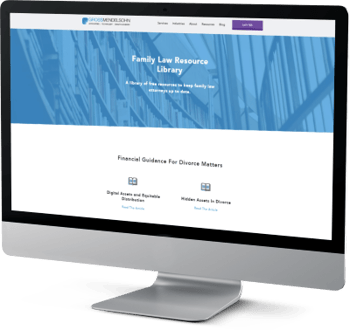When valuing a business as part of a divorce proceeding, it’s critical to understand the distinction between personal and enterprise goodwill. Knowing how to distinguish between the two could have a significant impact on the financial outcome of the case.
An increasing number of states operate under the principle that while enterprise goodwill is part of the marital estate, personal goodwill is not a marital asset subject to distribution. Instead, personal goodwill is the future earning potential associated with an individual’s personal attributes and is excluded from the marital estate.
Goodwill can be defined in multiple ways. For example, under generally accepted accounting principles (“GAAP”) goodwill is defined as “an asset representing the future economic benefits arising from other assets acquired in a business combination that are not individually identified and separately recognized.”
A common resource in the valuation community, Shannon Pratt and Alina Niculita’s Valuing a Business: The Analysis and Appraisal of Closely Held Companies, defines goodwill as “an intangible asset category usually composed of elements such as name or franchise reputation, customer patronage, location, products, and similar factors.”
Distinguishing Between Personal and Enterprise Goodwill
Let’s take a closer look at the two types of goodwill.
Goodwill can be separated into two buckets: personal goodwill and enterprise goodwill. Personal goodwill, also called professional, individual or celebrity goodwill, relates to an individual person. It is the part of goodwill attributable to an individual as opposed to an entity. Enterprise goodwill, on the other hand, is associated with the subject. It is the part of goodwill attributable to the entity as opposed to the individual.
Some characteristics of personal goodwill include:
- Personal relationships with customers, suppliers, employees, or even competitors that enhance the earning power of a company. For example, if an attorney leaves a law firm, will key clients leave as well, regardless of the quality of service and work they would receive if she stayed? Do employees stay at a company due to the personal charisma of its CEO?
- Skill. Skills can be physical (as in the case of a surgeon), intellectual (such as a wealth advisor), or a combination of both.
- Knowledge. Similar to skill, this can be defined as the unique possession of information or the ability to analyze information.
- Reputation. The reputation of a company may be derived in whole or in part from personal goodwill. For example, how much of Berkshire Hathaway’s value is based on the reputation of Warren Buffet?
A non-compete agreement can be a good indicator of the existence of personal goodwill, because the entity believes that there is some value in restricting competition if a key employee leaves.
Finally, since personal goodwill is often defined as goodwill that attaches to the personal efforts of an individual, it is generally considered to be nontransferable. If it is transferable, then it must be enterprise in nature.
The courts in both Maryland and Virginia treat enterprise goodwill as marital property, while personal goodwill is excluded from the marital estate.
Goodwill In Maryland
In Prahinski v. Prahinski, 1990, the Maryland courts addressed the definition of goodwill and distinguished it between a business asset and an individual’s good reputation. The court indicated that “for professional goodwill to be marital property, it must be a business asset having a value independent of the continued presence or reputation of any particular individual.” Accordingly, in order for it to be distributable in Maryland, goodwill must be shown to be an asset distinct from, and not dependent on, the reputation or continued presence of the individual professional.
Goodwill In Virginia
The Virginia courts have rejected a “fair market value” standard of value for divorce. Instead, Virginia’s courts look to the concept of “intrinsic value” when determining the value of a business. As discussed in Howell v. Howell, 2000, the Virginia Court of Appeals stated that “professional goodwill is attributable to the individual and is categorized as separate property in a divorce action.” Further, in Hoebelheinrich v. Hoebelheinrich, 2004, the Virginia courts indicated that as a matter of law, “goodwill attributable to personal characteristics is considered separate property and goodwill attributable to the business entity is considered marital property.”
Personal Goodwill Has a Huge Impact On the Marital Estate
The importance of personal goodwill to the marital estate can be shown in the following hypothetical divorce between Robert and Sarah Jones. We’ll look at two scenarios to illustrate the impact that personal goodwill has on the marital estate.
Robert started RJ Company, Inc. shortly after marrying Sarah. Robert owns 100% of RJ Company, Inc. and Sarah worked outside of the business. They live in an equitable distribution state where any marital assets are split 50/50. A business valuation was conducted to value RJ Company, Inc. for the purposes of the divorce proceedings. The value of RJ Company, Inc. was determined to be $4 million.
In scenario #1, we assume that Robert does not possess any unique skills and/or business relationships that couldn’t be transferred. As a result, we assume that there is no personal goodwill attributable to Robert. In this case, the entire $4 million would be considered part of the marital estate.
Under scenario #2, Robert has significant relationships with some of RJ Company’s major customers, who only trust Robert to handle their accounts. In addition, Robert’s created a unique business process that is sought after in the industry. In this case, we might assume that a significant amount of personal goodwill is attributable to Robert. If the valuation analyst determined that the value of the personal goodwill was $1 million, then $3 million would be considered part of the marital estate.
Both Robert and Sarah’s portion of the marital estate related to RJ Company under scenario #1 would be $2 million. Under scenario #2, however, Sarah’s portion drops to $1.5 million and Robert’s portion would be $2.5 million.
As you can see, it’s quite important to understand the differences between personal and enterprise goodwill as it could have a significant impact on the marital estate to be distributed.
Need Help?
Our Forensics & Litigation Support Group can help, contact us online or call us at 800.899.4623.


